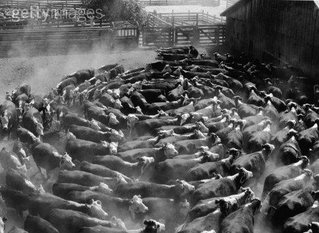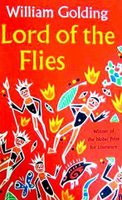
Every now and then, a piece of teenage fiction is published which causes almost universal controversy; this is not a new phenomenon, happened as long ago as
The Catcher in the Rye back in 1951. However, few teenage books have caused as much outrage in the UK as
JUNK by
Melvin Burgess. Written in 1996, it tells the story of a group of teenagers who fall into heroin addiction and anarchism on the streets of Bristol. But, like most books that are the subject of protest, the novel itself is simply a fantastic work of fiction; and one which, rather than patronising its teen audience, actually treats them with respect, and credits them with the ability to cope with difficult, adult themes.
JUNK won the Carnegie award in 1996, and has become one of the most important teenage novels ever written.
This is how it starts:
A boy and a girl were spending the night together in the back seat of a Volvo estate car. The car was in a garage. It was pitch black.
"I'm hungry," complained the girl.
The boy turned on a torch and peered inside a grey canvas rucksack behind him. "There's an apple."
"Nah. Any crisps left?"
"Nope."
Gemma sighed and leaned back in the car. She pulled a blanket over herself. "It's cold," she said.
"Barry'll be here soon," Tar said. He watched her closely in the torchlight, frowning anxiously. "Sorry you came?" he asked.
Gemma looked over and smiled. "Nah."
Tar snuggled up against her. Gemma stroked his head. "You better save the batteries," she said in a minute.
Tar turned off the torch. At once it was so black you couldn't see your own hand. Surrounded by the smell of damp concrete, oil and petrol, they carried on their conversation cuddling in the dark.
Tar said, "Come with me."
"What?" She was amazed, surprised. It had never occurred to her...He could feel her staring at him even though it was too dark to see anything. In the darkness, Tar blushed deeply.
"You must be crazy," said Gemma. "Why?"
"What have I got to run away from?"
"Wait till you get home." The two laughed. Gemma had been banned a week before from seeing Tar. Her parents had no idea where she was that night, but they had a pretty good idea whom she was with.
"It'd be something to do," said Tar in a minute. "You're always saying how bored you are."
"That's true." Gemma was the most bored person she knew. Sitting in class sometimes she felt dizzy with it, that she'd pop or faint or something if it didn't stop. She felt she'd do anything just to have a life.
Still...
"What about school and that?"
"You can go to school any time."
"I can run away any time in my life."
Gemma would have liked to. She wanted to. But...What for? She didn't love Tar, she only liked him. Her parents, and her father in particular, were totally ghastly but he didn't knock her around. Not yet anyhow.
Was being bored a reason for running away to the city at fourteen years old?
Gemma said, "I don't think so, Tar."
Tar lay still in her lap. She knew what he must be feeling because she'd seen it on his face so many times. Tar's heart was painted on his face.
Gemma bent down close. "I'm sorry," she whispered.
Tar had a reason, plenty of reasons. The latest were painted on his face, too. His upper lip swelled over his teeth like a fat plum. His left eye was black, blue, yellow and red. Gemma had to be careful not to touch his wounds when she stroked his face.
There was a noise at a small door behind them. Tar and Gemma ducked down out of sight behind the seats.
"'It's only me."
"Bloody hell -- you nearly killed me," hissed Gemma angrily.
"Sorry. Here, put that torch on so's I can see where I'm going."
Tar shone the beam over to a plump blond boy carrying a plastic bag. He grinned and came over.
"I suppose we ought to have a secret knock or something," he said. "Here." He handed over the bag. Gemma poked inside.
"It's only rolls and cheese. They'd have missed anything else," apologised Barry.
"Didn't you get any butter?" complained Gemma.
"No. But I got some pickle." Barry handed over a pot from his coat pocket.
"Branston. Brilliant!" Gemma began tearing up the rolls and chunks of cheese. Barry had forgotten a knife; she had to spread the pickle with her finger.
Barry watched Tar's face by the torchlight. "Christ! He really laid into you this time, didn't he?"
"Looks like a bowl of rotten fruit, doesn't it?" said Gemma. "Not that you'd want to eat it."
They laughed.
"You haven't been turning the light on, by the way, have you?" asked Barry anxiously. "Only..."
"We said we wouldn't, didn't we?" demanded Gemma.
". . . only they might see it through the cracks in the garage door."
"I told you"
"All right."
Gemma stuffed a roll leaking pickle into her mouth. "Wan won?" she asked Tar thickly.
"Yeah, please." He beamed.
There was a pause while Gemma pulled another roll in half.
"When are you going?" Barry wanted to know.
"Tomorrow," said Tar.
"Got everything?"
Tar leaned over the front seat and patted his rucksack. It wasn't that full.
Barry nodded. He watched Tar eating for a second and then he blurted out, "But what about your mum?"
Tar looked stricken.
Gemma glared. "His mum's gonna be all right. She'll probably clear off herself once Tar's gone. She's only been staying because of him anyway; she's said that thousands of times, hasn't she?"
Tar nodded slowly, like a tormented tortoise. Gemma glared at Barry and mouthed, "Shut up!"
"Right." Barry nodded energetically. "Best thing you could do for her, clear off. She won't have anything to tie her to the old bastard then."
"That's what I'm hoping," said Tar.
It got very cold in the garage later on. Gemma and Tar snuggled up together and wrapped the blankets around them. They kissed. Gemma didn't stop him when his hand glided under her top, but when she felt his hand sliding down her tummy she slapped his fingers lightly.
"Naughty," she said.
"Why not?" asked Tar in surprise.
"Not here..."
She didn't mind him touching her there. But she was worried about spending the night together...
"I just don't want it to go any further."
"You might never see me again after tonight," said Tar cunningly.
Gemma shook her head.
"It won't go any further, then."
"All right."










